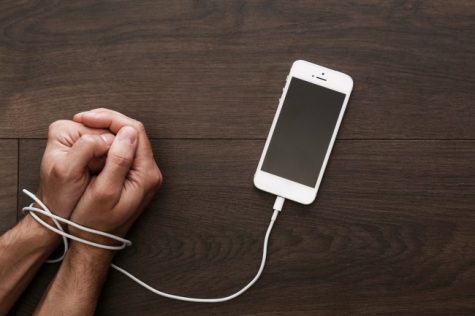Can you actually be addicted to your cell phone? Research says yes.
Do you ever feel naked, incomplete or anxious when your phone is not with you? Well, you are not the only one. According to new TIME Mobility Poll, about 84% of people surveyed were addicted to their phones and do not go a single day without them. Much of cell phone addiction is linked to social media.
In the Diagnostic and Statistical Manual of Mental Disorders (commonly called the DSM-5), which is the text that doctors use to diagnose addiction and mental disorders, here the symptoms of addiction.
- A need to use it more and more often in order to achieve the same desired effect.
- Persistent failed attempts to use it less often.
- Preoccupation with its use.
- Turns to it when experiencing unwanted feelings such as anxiety or depression.
- Excessive use characterized by loss of sense of time.
- Has put a relationship or job at risk due to excessive use
- Withdrawal, it is unavailable (anger, tension, depression, irritability, restlessness).
While these symptoms were initially written to apply to drugs, alcohol, gambling or other addictions, it can easily be applied to cell phone use as well. And according to a 2015 article in the Delhi Psychiatry Journal, it is probable that cell phone addiction (or nomophobia, the fear of being without a mobile device) will soon be added to the DSM-5 as a diagnosable condition.
Ever since social media has grown in popularity, kids and adults have been more attached to their phones. Forbes Magazine states that social media is very addictive, and several sources confirmed that it was intentionally designed to be addictive. Its random nature of likes and comments have been compared to slot machines.
Social media can be dangerous for many people of all ages, but especially the younger audience. The eighth grade guidance counselor Mrs. Borden states, “Seeing young kids with cell phones makes me concerned. The younger the child, the more concerned I am because, do they know internet safety?”
The distraction of phones alone can be dangerous, and not just while driving, which has received the most publicity. A man named Joshua Burwell was in San Diego looking over a beautiful sunset trying to get a photo like most of the tourists there. When he was walking, he was very distracted by his phone as he fell off the sixty foot cliff to his death on Christmas 2015.
Research on the generations that have had access to cell phones their entire lives should be available soon to show the effects of what cell phones actually do to us behaviorally, mentally, and physiologically. Many predict that the results will be alarming–perhaps alarming enough to spark widespread change in people’s phone habits.
Already, research indicates that phone use impacts posture due to the fact that people are hunched over when they are on their phones. The Joint, a chiropractic website, states, “This does not bode well for long term musculoskeletal health outcomes as the shoulders, the neck, and the spine are malformed.” The website also talks about how our heads, when looking forward, are too heavy for our necks, so when our heads are leaned down for long periods it can not only
damage our neck and back but it can strain it toothe added weight causes muscle strain and even damage to the vertebrae.
Cell phones can also cause damage to eyes. NewsBeat claims that screens in general can do long term damage to the eye–resulting in blurred vision, poor depth perception, or eye twitching. Phone companies have been getting complains that zooming in and out on the small devices makes people dizzy according to YourSightMatters.com
Furthermore, scientists have proven that phones are bad for our brains and disrupt our sleep. In order to sleep we have a hormone, melatonin, in our brains that controls our sleeping and waking patterns. Melatonin can’t reproduce when people are exposed to the blue backlighting of phones, tablets, and televisions. This means that when adults and kids use phones before bed, sleep patterns are disrupted, and the user will likely struggle to fall and stay asleep.
Seventy one percent of people who took a online survey said they sleep next to their phones, and thirteen percent said they sleep with their phones inside their beds.
Of the eighth-graders surveyed here at MMS, that number held true with 78% sleeping next to their phones. Reasons cites were that they like to go on it until they fall asleep and so that it’s within reach at night. One student, A’niya Williams said, “I can’t go to sleep without it.” Another eighth grader, Bryant Johnson, said, “If I had to go a week without my phone, I wouldn’t survive.” He said he checks to see if he had any missed calls or alerts as soon as he wakes up. Revolution student Megan Wilson admitted that she is “probably” addicted to her phone, adding that if she had to go a week without it, “I wouldn’t die, but like, I would miss it.”
This generation has almost always had cell phones and other electronics in their lives and the result is an intense feeling of attachment.
Are you Addicted? Take the Quiz
 If you answer YES to more than five of the fifteen questions below (Greenfield 2013), you are in danger of addiction and should take steps to cut back. If you answer YES to more than ten, you would qualify as an addict under the DSM-5, and should take serious steps toward changing your phone habits.
If you answer YES to more than five of the fifteen questions below (Greenfield 2013), you are in danger of addiction and should take steps to cut back. If you answer YES to more than ten, you would qualify as an addict under the DSM-5, and should take serious steps toward changing your phone habits.
- Do you find yourself spending more time on your smartphone than you realize?
- Do you find yourself mindlessly passing time on a regular basis by staring at your smartphone even though there might be better or more productive things to do?
- Do you seem to lose track of time when on your cell phone?
- Do you find yourself spending more time on your phone as opposed to talking to real-time people?
- Has the amount of time you spend on your cell phone been increasing?
- Do you secretly wish you could be a little less connected to your cell phone but have trouble cutting back?
- Do you sleep with your smartphone on or under your pillow or next to your bed regularly?
- Do you find yourself viewing and answering texts, tweets, and emails at all hours of the day and night, even when it means interrupting other things you are doing?
- Do you text, email, tweet, or surf the internet while doing activities that require your focused attention and concentration?
- Do you feel your use of your cell phone actually decreases your productivity at times?
- Do you feel reluctant to be without your smartphone, even for a short time?
- When you leave the house, you ALWAYS have your smartphone with you and you feel ill-at-ease or uncomfortable when you accidentally leave your smartphone in the car or at home, or you have no service, or it is broken?
- When you eat meals, is your cell phone always at the table?
- When your phone rings, beeps, buzzes, do you feel an intense urge to check for texts, tweets, or emails, updates, etc.?
- Do you find yourself mindlessly checking your phone many times a day even when you know there is likely nothing new or important to see?












